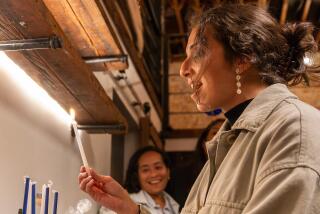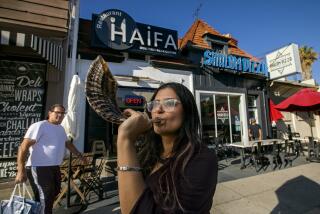Russian Parody Not So Funny to Some Israelis
- Share via
JERUSALEM — She speaks mangled Hebrew, piles her platinum hair in a garish heap and wears glasses that look like headlights. Add a cashier’s smock and Russian accent and you have Israel’s latest sensation: Luba.
Luba is a fictional supermarket checker and a regular character on “Eretz Nehederet” -- or “Wonderful Country” -- a television comedy show known for its piquant spoofing of both the powerful and humble.
Played by a man, Tal Friedman, Luba has won the hearts of many Israelis with her blend of moxie and world-weary exasperation. Obnoxious shoppers -- and Israeli viewers know who they are -- get it right back from Luba, tortured tongue and all. In Luba’s world, the specter of firing remains ever-present. (“No job,” she laments, “no language.”) She reminds customers that life is tough so regularly that kasheh -- Hebrew for “difficult” -- is now a national catchword.
Schoolchildren and TV news reporters quote her. Knesset members want to be seen with her. Internet chat rooms revel in her. And the just-ended Purim holiday, an occasion for Halloween-style dressing up, was a field day for would-be Lubas. Babies and even dogs were decked out in blond wigs, cashier vests and oversize glasses.
For all the frivolity, though, Luba’s popularity has prompted sober discussion of the satirical depiction of an immigrant from the former Soviet Union at a time when that group has made significant inroads into Israel’s mainstream.
The community now accounts for nearly 1 million Israelis -- or close to a sixth of the country’s population -- after an influx of Jews in the early 1990s, most from Russia. Because many cashiers came from the former Soviet Union, Luba draws on recognizable aspects of Israeli life. Her robotic recitation of the daily marked-down items, for example, mocks a common Israeli checkout routine.
But some immigrant leaders see her as an unflattering representative of a community that boasts a large number of highly educated professionals. Many newcomers find it discomfiting to watch the rest of the country roll with laughter while the burly Luba wrestles with her adopted language and rude shoppers.
“She’s 50-plus. She’s fat. She’s blond and she has big breasts. Plus she speaks awful Hebrew,” said Marina Solodkin, a Knesset member who arrived from the former Soviet Union in 1991. “We have ... immigrants working as cashiers, but most of them are not cashiers. They’re engineers and economists.”
The Luba craze has become something of a curse for immigrant cashiers because shoppers -- perhaps in good fun -- launch into pidgin Hebrew as soon as they spot a cashier with a Russian name.
Marina Kuzmin, a Ukrainian immigrant who works at a Jerusalem supermarket, said she enjoys the character but has had enough of the jokes.
“I find it difficult to work. Every second person who comes around says, ‘seder,’ ” she said, mimicking one of Luba’s signature mispronunciations.
Solodkin objected after a fellow Knesset member, Colette Avital, invited Luba to appear before the parliament’s immigration committee to discuss the image problem.
Avital said Luba’s appearance was to be half-serious, in the Purim spirit. Though fellow Knesset members clamored for seats, the session was scratched in the end due to a burst of media attention and controversy.
Avital said the broader questions have extended Luba’s importance well beyond the TV show, whose season finale recently aired. Avital said she would conduct a hearing soon, even without Luba, on mutual misperceptions between Russian immigrants and other Israelis highlighted by the episode.
Cultural critic Gadi Taub said he considered Luba an inspired commentary on the Israeli society in which she had landed -- a place of bustling consumerism and fragmented social purpose that to the newcomers is “often just a shabby version of America.”
Taub, who teaches at Hebrew University in Jerusalem, said, “When you watch this, you’re thinking, ‘Is this the stereotype of Russians from the Israeli point of view, or a stereotype of Israelis from the Russian point of view?’ It is both.”
Emigres have made significant strides in Israeli society since the wave of migration peaked a decade ago. They have taken their places alongside other Israelis as doctors and teachers and even dissolved their immigrant political party in favor of joining mainstream groups. Twelve of the Knesset’s 120 members are immigrants from the former Soviet Union.
Muli Segev, the program’s executive producer, said the show marked the first time that the world of Israeli comedy had dealt at length with the Russian community. That, he said, showed the degree to which the newcomers had arrived.
“It means they’re a part of the family,” Segev said. “You have a new friend and are careful with him at first. But when you’re close enough, you can make fun of him.”
Divisions linger. Many Russians, especially those who were accomplished professionals when they came, bristle at the menial jobs they have had to take and resent being viewed as low-end laborers.
For their part, Israelis see their Russian neighbors as insular and aloof. Many immigrants settled in clusters, making it easier to retain their language and customs. The stay abreast of events through Russian-language newspapers and TV. In coastal Ashdod, where many immigrants settled, some streets are labeled in Russian alone.
“They’ve made their inroads, but they continue a very serious cultural separation,” Avital said.
Luba -- gaudy get-up and all -- has sparked a dialogue that may help bridge that gap. If so, it would mirror her working-class heroine image on the program, where her friends include an Arab grocery worker.
Segev, the executive producer, said the show’s planners hadn’t decided whether Luba would return when the show resumes in July.
Kuzmin, the Jerusalem cashier, hopes so. “It gives me something to do on Friday night,” she said. “I’m sick of American movies.”
More to Read
Sign up for Essential California
The most important California stories and recommendations in your inbox every morning.
You may occasionally receive promotional content from the Los Angeles Times.










